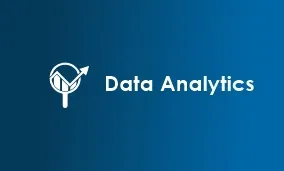
Data Analytics
Course Overview of the Affordable Data Analytics Training Program in Bangalore
The Affordable Data Analytics Training Program in Bangalore is designed to equip participants with the skills and knowledge necessary to analyze data effectively, uncover patterns, and derive actionable insights. This course covers the entire data analytics lifecycle, from data collection and cleaning to visualization and interpretation, providing a solid foundation for anyone looking to excel in the field of data analytics.
1. Develop the ability to analyze and interpret complex datasets.
2. Gain proficiency in using data analytics tools and technologies.
3. Learn best practices for data-driven decision-making.Learn data analytics with real experts, either in live classes with videos or without videos, whichever suits you best.
Description
This course begins with an introduction to data analytics, covering the basic concepts, techniques, and tools used in the industry. Participants will learn how to collect, clean, and preprocess data, as well as how to perform exploratory data analysis. The course also delves into advanced topics such as statistical analysis, predictive modeling, and data visualization. Real-world examples, hands-on projects, and case studies will be used to reinforce theoretical concepts.1. Gain practical experience with hands-on data analysis exercises.
2. Build real-world projects that reflect industry practices.
3. Explore the integration of data analytics with other business intelligence tools.Course Objectives
The primary objectives of the Data Analytics course are as follows:1. Introduction to Data Analytics: Provide an overview of data analytics, its importance, and its applications in various industries.
2. Data Collection and Cleaning: Explore techniques for collecting data from various sources and cleaning it to ensure accuracy and consistency.
3. Exploratory Data Analysis: Learn methods for summarizing and visualizing data to uncover patterns, trends, and relationships.
4. Statistical Analysis: Understand the fundamentals of statistical analysis, including hypothesis testing and regression analysis, to make data-driven decisions.
5. Predictive Modeling: Explore predictive modeling techniques, such as linear regression, decision trees, and machine learning algorithms, to forecast future trends.
6. Data Visualization: Cover data visualization tools and techniques, such as dashboards and charts, to communicate insights effectively.
7. Data Interpretation: Learn how to interpret analytical results and translate them into actionable business strategies.
8. Big Data Analytics: Introduce big data concepts and tools for analyzing large datasets, such as Hadoop and Spark.
9. Business Intelligence Integration: Discuss the integration of data analytics with business intelligence platforms for enhanced decision-making.
10. Ethical Considerations: Teach the ethical implications of data analytics, including privacy concerns and data governance.
11. Performance Optimization: Learn strategies for optimizing data analysis workflows for efficiency and accuracy.
12. Case Studies: Analyze real-world case studies to understand how data analytics is applied in different industries.Prerequisites
1. Basic understanding of statistics and mathematics.
2. Familiarity with programming languages such as Python or R.
3. Knowledge of data structures and algorithms.
4. Understanding of database concepts and SQL.
5. Awareness of data visualization tools like Tableau or Power BI.
6. Experience with Excel or other spreadsheet software.
7. Prior exposure to data analytics or business intelligence concepts (optional but beneficial).Who Can Learn This Course
This course is suitable for a diverse range of individuals, including:1. Data Analysts: Professionals aiming to enhance their skills in data analysis and interpretation.
2. Business Analysts: Individuals interested in using data analytics to inform business decisions and strategies.
3. Data Scientists: Those looking to build a strong foundation in data analytics before moving on to more advanced topics.
4. IT Professionals: Technology professionals seeking to integrate data analytics into their existing skillset.
5. Students and Graduates: Individuals pursuing degrees in data science, business, or related fields with an interest in data analytics.
6. Marketing Professionals: Professionals involved in analyzing market trends and customer data to drive business growth.
7. Project Managers: Individuals overseeing projects that require data-driven decision-making and analysis.
8. Anyone Interested in Data Analytics: Enthusiasts curious about leveraging data analytics to uncover insights and make informed decisions.The Data Analytics course is designed to cater to both beginners and individuals with some experience in data analysis, providing a comprehensive understanding of the data analytics process and practical skills for analyzing and interpreting data.
Course Curriclum
Training Features
Comprehensive Curriculum
Master web development with a full-stack curriculum covering front-end, back-end, databases, and more.
Hands-On Projects
Apply skills to real-world projects for practical experience and enhanced learning.
Expert Instructors
Learn from industry experts for insights and guidance in full-stack development.
Job Placement Assistance
Access job placement assistance for career support and employer connections.
Certification upon Completion
Receive a recognized certification validating your full-stack development skills.
24/7 Support
Access round-the-clock support for immediate assistance, ensuring a seamless learning journey.
Upcoming Batches
Placed Students
Enroll now and join our alumni.
Explore More Courses
Enroll for : Data Analytics
Start Date: 2024-10-01
Mentor: Working Professional
Duration: 3 Months
